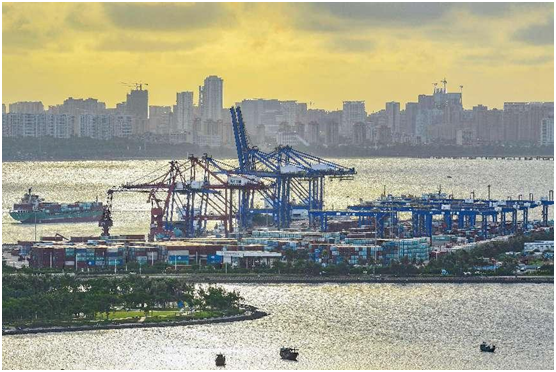Business
Booming service trade brings better life to Chinese people

By Luo Shanshan, People’s Daily
Service trade is an important part of international trade and a major area of international economic and trade cooperation. Its development is closely related with people’s life quality.
China has achieved sound performance in service trade this year despite the ever-changing external situations. In the first half of this year, China’s service trade value surged 21.6 percent year on year to 2.89 trillion yuan (about $421 billion). In particular, service exports expanded 24.6 percent yearly to nearly 1.41 trillion yuan, and service imports were over 1.48 trillion yuan, up 18.9 percent from a year ago.
The remarkable half-year progress mirrored China’s achievements in high-level opening up.
In recent years, the country has taken multiple measures to promote the high-quality development of service trade and made firm steps to expand opening up.
It has worked to ensure that measures and policies are effectively implemented in cities where pilot projects for the innovative development of service trade are launched. It has kicked off pilot programs to expand opening up in service trade, and introduced and improved a negative list mechanism for cross-border trade in services. Besides, the country has vigorously promoted digital trade, significantly widened market access of the service sector, and expanded imports of high-quality services.
China has maintained the world’s second largest trader of services for years, enjoying steady growth in the trade of knowledge-intensive services.
However, the country’s service trade still sees a long way ahead before it meets the intrinsic requirements of China’s high-quality development.
From a demand-side perspective, service consumption is gradually taking a bigger share in China’s consumption structure that was once dominated by material consumption.
A report by China Institute of Reform and Development predicted that service consumption would account for over half of China’s total consumption by 2025, and the ratio might reach 60 percent to 65 percent by 2035. The upgrading consumption structure is expanding people’s demand for service trade.
From a supply-side perspective, the added value of China’s service sector increased 8.2 percent year on year in 2021 and accounted for 53.3 percent of China’s GDP. The upgrading industrial structure has significantly expanded the country’s demand for service trade. Besides, China’s industrial upgrading and service trade will be closely integrated. For instance, the digitalization of the service sector and digital services are expected to push China’s service trade toward the high end of the value chain.
As China enters a new phase of development, service trade has gradually becomes a new impetus expanding China’s opening up and a new engine driving the country’s domestic demand. It plays an important role in building a new development paradigm.
China will further open up its service industry and accelerate the alignment of the standards and rules in its service sector with those of the world, so as to build a business environment that’s conducive to the development of service trade.
Facing unexpected impacts from both home and abroad this year, China has unswervingly followed a path of high-level opening up to cope with external uncertainties and actively nurtured new advantages in service trade.
In March, seven departments, including the China’s Ministry of Commerce(MOFCOM), approved 40 specialized bases for exports of featured services. So far, these bases, housing 112 exporters, are exporting services in seven sectors, including culture, traditional Chinese medicine and digital services.
Recently, the MOFCOM, together with other 26 departments, jointly issued a piece of opinion on fostering high-quality development of cultural trade to take Chinese culture to the world.
The 2022 China International Fair for Trade in Services will be held in early September. China will definitely attract more high-quality services that will assist its industrial upgrading, make people’s life better and inject new impetus to the development of service trade.
Business
Dangote Refinery Boosts Fuel Exports as Gulf Refineries Shut Down

By: Fabian Apechihin
The Dangote Petroleum Refinery has ramped up fuel exports to international markets amid widespread refinery shutdowns in the Middle East, industry sources confirmed.
A senior official at the $20bn Lagos-based plant told The PUNCH that the facility exported significant volumes of petrol (PMS), diesel (AGO), and aviation fuel (Jet A1) to foreign buyers in August, following earlier shipments in June and July.
The surge comes as Saudi Aramco and other regional producers face heavy maintenance schedules, tightening fuel supply. Aramco has already shut down two plants and plans further closures, including its 460,000 b/d Satorp refinery in Jubail for a 60-day turnaround in November–December. Kuwait and India are also scaling back capacity for maintenance and seasonal demand.
According to Argus Media, these shutdowns are pushing Gulf nations to import record volumes of gasoline, with Saudi Arabia and the UAE sharply increasing purchases from Europe and other markets in recent months.
While some reports pointed to operational constraints at Dangote’s 650,000 b/d facility, the company dismissed such claims, insisting production is on track to reach 700,000 b/d by December. Earlier this year, Aliko Dangote announced the refinery had sold two cargoes of jet fuel to Saudi Aramco and recently achieved exports of about 1 million tonnes of petrol between June and July.
“With Gulf refiners offline, Nigeria has now emerged as a net exporter of refined products,” Dangote said.
Analysts suggest the extended refinery outages in the Middle East will further strengthen demand for Dangote’s output, positioning the Nigerian plant as a key supplier in regional fuel markets.
Would you like me to tighten this further into a 5–6 paragraph wire-style news brief, or keep it as a detailed feature-style report with more context on Gulf refinery shutdowns?
Business
US Oil Exports to Nigeria, Others Fall to 3.3m bpd as Local Output Rises

By: Fabian Apechihin
The United States’ crude oil exports to Nigeria and other African countries fell for the fifth consecutive month in July 2025, averaging 3.3 million barrels per day (bpd), the lowest level since March 2022.
The Organisation of Petroleum Exporting Countries (OPEC) disclosed this in its August 2025 Monthly Oil Market Report (MOMR), attributing the decline to weaker flows to Europe and Africa, particularly Nigeria, but without giving further details.
Industry analysts link the slowdown to the ramp-up of local refining capacity, especially the 650,000 bpd Dangote Refinery, which has reduced Nigeria’s reliance on imported crude, including from the US. Vanguard checks also show that crude importation has slowed further in recent months due to improved domestic production.
According to OPEC data, Nigeria’s crude oil output—excluding condensates—rose by 11 per cent year-on-year to 1.559 million bpd in July 2025, up from 1.386 million bpd in the same period of 2024. This marks the country’s highest monthly production level so far this year.
The Nigerian Upstream Petroleum Regulatory Commission (NUPRC) corroborated the figures, stating that overall output, including condensates, exceeded 1.8 million bpd in July.
Gbenga Komolafe, Chief Executive of the NUPRC, said the milestone was achieved through the agency’s “Project 1 MMBOPD Incremental” initiative, supported by a multi-stakeholder collaborative framework.
“We are glad to report that we crossed the 1.8 million bpd mark on peak production last month, with average production hovering at 1.78 million bpd,” Komolafe stated.
He added that the Commission is working to sustain production growth by optimising the Maximum Efficient Rate (MER) framework, improving produced water management, and aligning operational shutdowns and maintenance schedules to minimise disruptions.
“With these measures and continued collaboration, the presidential mandate on production increase is well within reach,” he said.
Do you want me to make this rewrite more concise for a newspaper front-page brief or keep it detailed like a full energy market report?
Business
NDYPC Hails Otuaro’s Reforms in Presidential Amnesty Programme

• Lauds transparency, fairness in beneficiary selection and grassroots empowerment
• Says reforms align with Tinubu’s Renewed Hope Agenda, restore trust in Niger Delta
The Niger Delta Youths for Positive Change (NDYPC) has commended the Administrator of the Presidential Amnesty Programme (PAP), Dr. Dennis Otuaro, for what it described as bold, people-focused reforms that are restoring trust and delivering tangible benefits to the Niger Delta.
In a statement signed and issued by Comrade Elliott Yibakeni, after the conclusion of leadership training sessions with ex-agitator leaders in Abuja, the group said the PAP, once in urgent need of renewal, is now undergoing a transformation that reflects transparency, fairness, and accountability.
“At a time when public trust in institutions was waning, Dr. Otuaro has emerged as a symbol of credibility and transformation,” the statement read. “His visionary leadership is restoring integrity, empowering communities, and driving a sustainable development agenda that resonates with the aspirations of the Niger Delta.”
According to NDYPC, under Otuaro’s leadership, beneficiary selection has become fair and merit-based, ending years of favoritism and political interference. The group added that access to education, skills training, and empowerment opportunities, both locally and abroad, is now guided by equity and open competition.
The group highlighted several internal reforms, including improved staff welfare, strengthened professional capacity, and strict adherence to best practices in public procurement. These, it said, have made the PAP more efficient, responsive, and transparent.
NDYPC also praised Otuaro’s inclusive governance style, noting his sustained engagement with traditional rulers, women leaders, civil society organizations, and local communities. This approach, the group said, has strengthened peace-building efforts and deepened trust between the PAP and the people it serves.
In line with President Bola Ahmed Tinubu’s Renewed Hope Agenda, the PAP has maintained consistent payment of stipends to ex-agitators and extended direct support to vulnerable populations. NDYPC also applauded new healthcare interventions for ex-agitators facing health challenges.
The statement further commended the programme’s investments in scholarships, vocational training, and economic empowerment initiatives aimed at preparing Niger Delta youths for leadership, innovation, and sustainable livelihoods.
“Every decision reflects a deep commitment to public trust, responsible stewardship, and long-term development,” NDYPC stated. “Under Dr. Otuaro’s watch, the Niger Delta is rising stronger, united, and filled with renewed hope.”
-

 Uncategorized5 years ago
Uncategorized5 years agoFG, states urged to harness flooding for ranching, others with technology – Agbaje
-

 Headlines10 years ago
Headlines10 years agoBreaking: EFCC seals Borno House of Assembly, as Hon members take to their heels
-

 News11 years ago
News11 years agoNigeria Security Operatives Stage Manhunt For Homosexual Perpetrator
-

 News9 years ago
News9 years agoHow 21-year-old Girl fled community over accusation of lesbianism
-

 News10 years ago
News10 years agoYobe Gov Moves Against Deputy
-

 Opinion7 years ago
Opinion7 years ago7 signs she has friend zoned you
-
Technology4 years ago
Online job placement company headhunts women
-

 Headlines10 years ago
Headlines10 years agoBorno Dep Gov Abducts Another Church Leader





